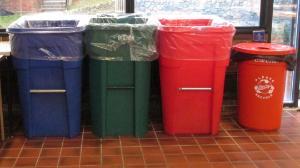Reduce, Reuse, Recycle
by Cassie LeBel
Why is it that despite our efforts, most of what we try to recycle gets thrown away? According to the Environmental Protection Agency (EPA) website in the year 2015 Americans recycled 67% of paper and 26% of glass. Also, out of the 35 million tons of plastic generated that year only 9.1% was recycled.
“I think if you poll people, probably eight to nine people out of 10 don’t realize what goes on with recyclables after they put them in the bin,” said Barnstable Town Council President Eric Steinhilber during a council meeting on August 9, as reported by The Barnstable Patriot. “More times than not, that just ends up in the trash anyway.”
Nauset Disposal is the waste disposal service that is used at Cape Cod Community College (4Cs). Nauset Disposal uses a single-stream recycling program which means that all glass bottles, plastic bottles, cardboard and paper should be thrown into the same bin to be sorted later down the line.
This seems simple, but what most people are unaware of is that there are still guidelines to follow besides throwing it all into one bin.
For example, caps on bottles should all be removed, newspapers should be tied up and most importantly all items going into a recycling bin should be clean.
This means that bottles should be rinsed and any food waste, from grease on a plate to the core of an apple, which is placed in a bin with recyclables has now deemed that the entire bin will be thrown away.
This is a huge problem on the 4Cs campus as most students who eat in the cafeteria are probably aware.
When going to throw trash away students are faced with three colored bins: red, green and blue. Nobody quite knows what those colors mean as there are no clear and defined labels.
Even those who do manage to sort their trash respectfully will have their efforts tossed aside as those who are careless or simply clueless will just throw their trash into whichever bin is nearest them, pizza crust and all, before heading off to class.
And who can blame them?
Wentworth Institute of Technology in Boston seems to have found a solution. Enrolled students can become a member of the Wentworth Environmental Collaborative (WECo.) which is a student organization that hopes to improve campus sustainability.
“We have separated trash, compost and single-stream recycling in our dining hall,” said Tatiana Kiss-Coviello, a student member of WECo. “Every building has multiple recycling bins.”
Their dining hall also uses biodegradable trays and plates and does not offer straws.
Despite these factors students a part of WECo. still have questions about where their waste goes.
“WECo. is currently investigating Wentworth to see if they’re actually recycling or just throwing it all in the trash,” said Kiss-Coviello.

Wentworth has a program for students to advocate for their environment, but at 4Cs there is currently no environmental or sustainability clubs in which students can go if they are faced with questions about on-campus recycling.
While there are a lot of questions that remain unanswered when it comes to recycling, it is important to note that recycling is just one of three ways to limit the amount of waste thrown away. Reducing and reusing are the other aspects of waste management that should be considered before things even come to recycling.
Reusable water bottles and travel mugs can be purchased at the bookstore and the cafeteria offers a pricing discount to those who bring their own mug to fill as opposed to taking a disposable one.
Students should also consider looking through old school supplies before purchasing new ones to see if they have anything they can use from the previous semester before going to the store to purchase new supplies, preferably ones made from recycled materials.
Currently, the only school supplies offered at the bookstore that are made from recycled materials are index cards.
As of October 2006, the 4Cs mission statement included “a distinctive focus on sustainability.” It is a focus which can no longer be found in the current mission statement despite the fact that 10 years later with our current climate conditions, sustainability is becoming a more crucial issue than ever.
“I think we need to leave this Earth, for our children, how we found it—or at least improve it,” said Campus Life Office Assistant Tina Frias, who for a brief time while the Sustainability Club was still active, sat as interim faculty advisor.
Students are heavily encouraged to use their voice to question the current recycling system in place and to advocate for better on campus sustainability.
Even small actions make a huge difference in the fight to improve our climate.
Categories: Around Campus,